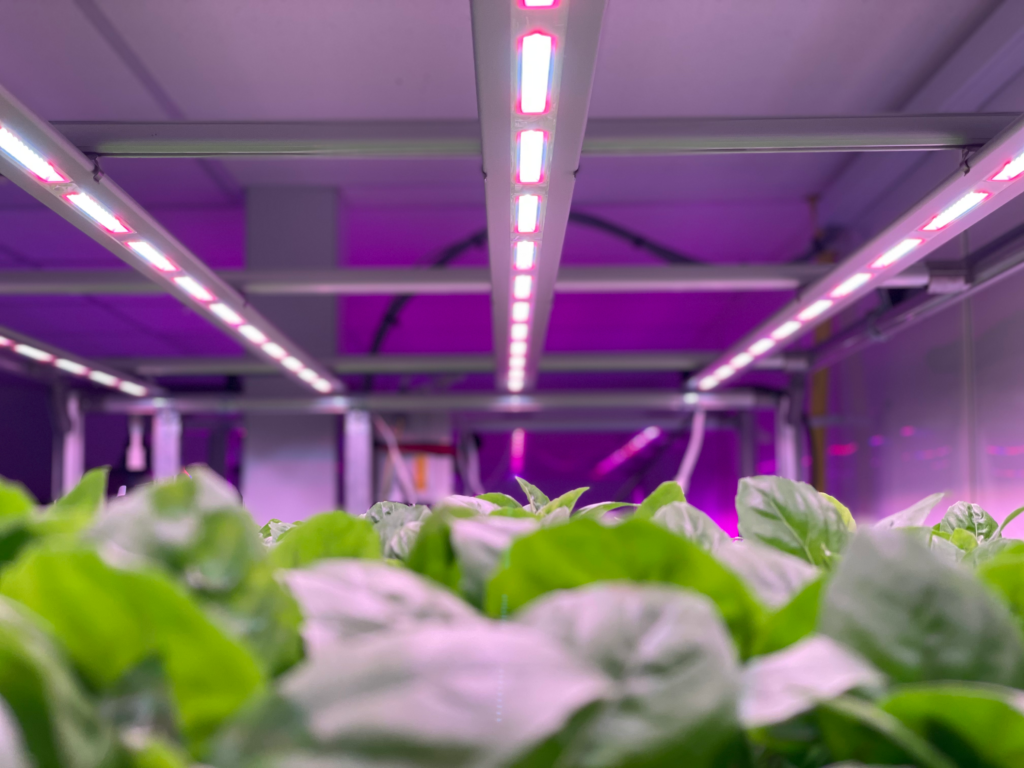MENZIES MANUFACTURING MAGAZINE
MANUFACTURING INSIDER INTERVIEW
This article was originally published by Menzies as an ‘Insider Interview’ in the October 2022 issue of their Manufacturing Magazine and newsletter.

Vertically Urban design and manufacture a range of high-quality horticultural LED lights for vertical farms and glasshouses. We spoke to their Marketing Manager, Neil Arden, to understand more about the company and the significant increase in the popularity of vertical farms.
DEMAND FOR LOCALLY SOURCED FOOD
Vertical farms have seen a real increase in demand over the last few years, due in no small part to market pressures in the food supply chain. We all saw the empty shelves at the start of the pandemic. This was followed by the War in Ukraine, with increasing petrol prices putting supply chains under considerable pressure. These challenges, combined with climate change, are driving both individuals and businesses to take more responsibility for their actions – including sourcing food locally and reducing mileage. This creates a strong position for local farming and in particular vertical farms. These can be situated next door to supermarkets, flats, etc. – and are so discreet, that often no one knows they’re there!
‘Why ship iceberg lettuce from Africa when you can grow it in Yorkshire?’
WHAT MAKES VERTICALLY URBAN UNIQUE?
Vertically Urban has embraced advances in LED technology, creating innovative and increasingly efficient products. For example, their Horti-blade which, at only 8mm thick, is the thinnest luminaire on the market, an important feature in vertical farms where space is at a premium. Fully encased in food safe polyurethane resin, the Horti-blade is protected from water ingress and is easy to keep clean. It’s also one of the most effective and efficient grow lights available.
The company has also invested heavily in plant science and have both an in-house plant scientist and a fully featured development grow lab. This has been crucial in the development of their proprietary ‘lighting recipes’ that can tune growth to the exact customer specification.
Not ones to rest on their laurels, the team at Vertically Urban is now utilising its experience to create an advanced cloud-based artificial intelligence control system for vertical farms. The goal is for HORISS, as it is known, to eventually be able to monitor and control every aspect of the vertical farm environment, detecting issues with growth early on and taking remedial action to ensure a successful crop. This degree of AI control will unlock the potential of future farms, producing consistently reliable crops using as few resources as possible and with minimal human input.
Crucially, unlike larger and less agile corporates, Vertically Urban have the capacity to work in partnership with their customers to create a bespoke package for each project. They have a genuine focus on design and innovation and work hard to produce some of the best products on the market.
UK MANUFACTURING
In the experience of Vertically Urban, UK manufacturing remains well-regarded around the globe and the hunger for British-made products shows no sign of waning with customers willing to pay the premium price that it attracts, over products from the far east for example.
Vertically Urban proudly manufacture all their products in their state-of-the-art factory not far from Leeds. Their commitment to quality is evident, working with only a selected group of tier 1 suppliers they ensure that the best available components are used to manufacture their luminaires at every stage of the process. This obsession with quality is one of the reasons why they are rapidly building a reputation as one of the most trusted companies in the industry.
The client base of Vertically Urban is extremely varied, ranging from traditional farmers to tech investors with no engineering or growing experience, from local individuals growing in a garage to multimillion pound mega projects based all around the world.
THE FUTURE OF VERTICAL FARMS
Whether it’s a supermarket chain building resilience in their supply chain, or a restaurant owner trying to become more self-sufficient and reduce costs. One thing is constant…we need to keep up with the demand for food and keep people fed now and looking to the future, ‘there is a big shortfall between the amount of food we produce today, and the amount needed to feed everyone in 2050.’ (WRI, 2018). Estimates vary, but it is thought that we’ll need to increase what we grow by up to 70% to account for this higher demand, against the backdrop of traditional farmland being lost to climate change at an alarming rate.
“Any way you look at it, by 2050 we need to be able to feed 9 billion people sustainably across the globe.”
Vertical farming is very much seen as a part of the solution to this conundrum and the revenue for global vertical farms looks set to increase exponentially over the next few years – from around £3 billion now, it is expected to be worth over £30 billion by 2030.
The biggest concern around vertical farms has always been the energy required to run them, but recent advances in both LED and renewable energy technology have opened the door to economic and ecological viability. In recent years, there has been an explosion in the popularity of vertical farms, in particular with large, well-known companies looking to invest for a variety of purposes. For example, M&S is collaborating with an agri-tech firm to bring fresh crops to its London stores. Ocado has invested in the region of £17m to develop vertical farms to grow herbs and leafy greens next to its distribution centres and Emirates Airlines has recently opened the biggest ever vertical farm in Dubai to service its catering department.
Any way you look at it, by 2050 we need to be able to feed 9 billion people sustainably across the globe. Vertical farming and the wider controlled environment agriculture sector is emerging as the most promising solution with the potential to not only grow the sheer amount of food required but also growing it exactly where it is needed.
